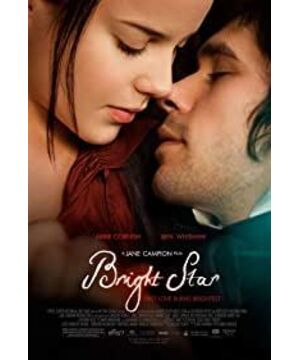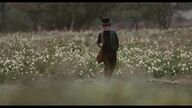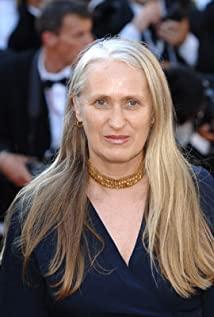The movie describes the time when the two met and fell in love with each other, but couldn't stay together because of the poverty of the poet, and finally the poet died in a foreign land. The beautiful idyllic scenery, poignant love, and intoxicating poetry combine into a sad but charming oil painting, and that feeling will always linger in my heart. Although the film is a biopic, I feel it is more of a romance. The poet's name is only the background of the film, and the poet's creative process is rarely mentioned in the film, and the poems mentioned are all because of the power of love. For example, the famous "Bright Star", in the arms of the lover, the poet recited this poem.
As mentioned at the beginning, this film is from the perspective of the heroine, so in the first half we see the enthusiastic and generous Fang Ni getting to know the poet, discovering the poet's talent, and gradually falling in love with the poet. In this section, the appearance of the poet is not Not many, and they all looked at the poet through Fang Ni's eyes, which felt unfamiliar. Slowly, the interaction between the two became more and more. After passing through the death of the poet's younger brother and the misunderstanding of the love letter in the cold dark blue tone (and at this time, the Fang Ni family also moved to the poet's next door), spring has come, nature The beauty of the two is unmistakably revealed, and the two also fall in love. This section is undoubtedly the brightest in the whole film: clear sky, colorful flowers, sweet love, beautiful people, and of course poetry, let us see scenes with beautiful tones. Beauty is always short-lived, and the two have to face the suffering of separation time and time again, and the tones are beginning to be more and more cold tones, and the reality of the poet is too poor to get married. The contradiction is becoming more and more prominent. At the beginning of the nineteenth century, this was indeed a very concrete and grim fact. The poet understands this well, and therefore he suffers and contradicts. However, what made this bitter love worse is that on a snowy night, the poet who returned from going out began to cough up blood, the disease found him, and the shadow of death shrouded them. In the end, this relationship was finally recognized by Fang Ni's mother, but the poet died in Italy.
In addition to the impressive tone contrast of the film, perhaps because of the female director, the small plots, small scenes, and small details are also well done. For example, the whole film starts with Fang Ni's sewing, and at the end, after learning of the poet's death, the scene of Fang Ni's sewing appears in the camera. At the end, Fang Ni wore this hand-sewn black dress, cut off her long hair, read the famous poem "Bright Star" written for her, and in the cold dawn, walked towards the two The woods that transitioned the good times. Also, after Fang Ni moved to the poet's next door, their bedroom was only separated by a wall, and the two put their hands on the wall to feel and listen to the world behind the wall. The kind of love that is always separated, cruel and beautiful, makes people sigh. Of course, in the short good time, we also saw two people holding hands and kissing in the back, and sister Fang Ni walking in front, as long as the little guy turned to the back, the two separated and stopped pretending to be a wooden man. Funny and warm picture , that kind of sweetness also blows against the backdrop of the beautiful nature, which makes people want to say: the scenery is so beautiful, and the love is so beautiful.
The poet died in 1821, only twenty-five years old, but left many masterpieces for future generations. Like Van Gogh, when he was alive, his poems were rarely praised, but after his death, his talent was noticed and recognized by the world. It was not until after Fang Ni's death in 1872 that her children took out the letters of the two people who had been carefully treasured by their mother all their lives for the sake of money, and we didn't know this love: sweet and cruel, moved and sighed. Maybe, next time, when I read "The Splendid Star" or other poems by the poet in love, I will think of this old story.
View more about Bright Star reviews











